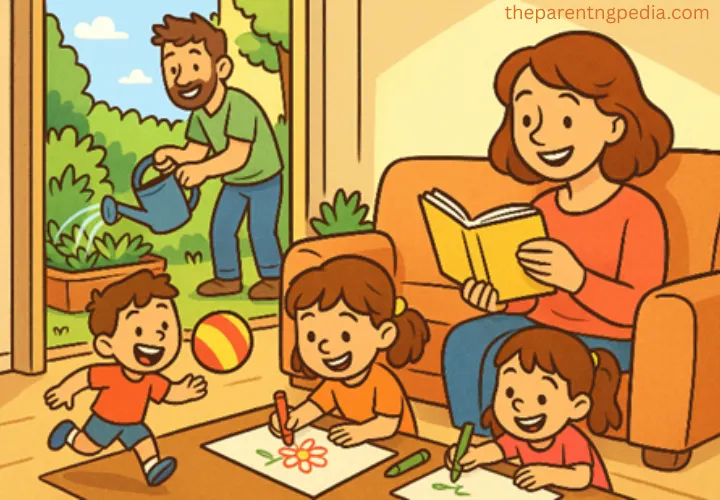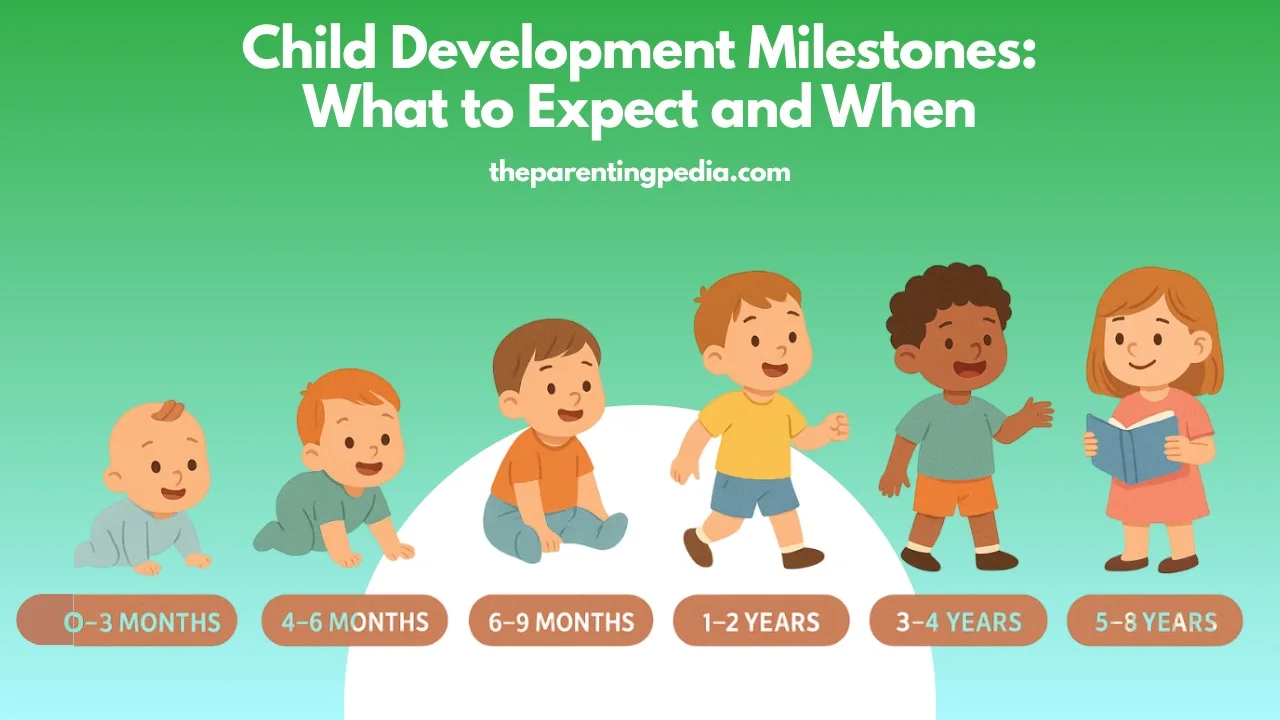Watching a child grow and change is one of the most exciting parts of parenting. Each little smile, step or word brings joy and pride. These small but important changes are called child development milestones, skills that most children achieve by a certain age. These include walking, talking, playing, learning and interacting with others. Understanding these milestones helps parents know what to expect and when to offer support. While every child is different and may grow at their own pace, milestones offer a helpful guide to track development and spot any possible delays early in children.
What Are Child Development Milestones?
Child development milestones are physical, emotional, social and cognitive skills that children typically develop as they grow. These are grouped into different areas:
Physical development: Physical development includes important skills such as rolling over, crawling, walking and grasping objects.
Cognitive development: Cognitive development involves learning skills like thinking, solving problems and understanding cause and effect.
Language development: Understanding speech and learning to talk are key parts of a child’s language development, helping them communicate their needs and thoughts.
Social and emotional development: Social and emotional development includes important milestones like smiling, playing with others and expressing feelings such as happiness, anger or fear.

Why Are Child Development Milestones Important?
Child development milestones help parents and caregivers understand if a child is growing as expected or identify areas where a child may need more support. Milestones also help parents communicate better with pediatricians and teachers or celebrate important achievements in a child’s life. If a child seems behind in many milestones, it doesn’t always mean something is wrong. But noticing the signs early allows for helpful support or intervention if needed.
Child Development Milestones by Age: What to Expect
Here is a general timeline of common child development milestones:
0 to 6 Months
- Child smiles at people.
- Follows moving things with eyes.
- Responds to sounds and turns toward voices.
- Starts cooing and babbling
- Begins to lift their head and push up with their arms while lying on their tummy
- Reaches for toys.
6 to 12 Months
- Sits without help.
- Begins crawling or scooting.
- Understands simple words like “no” or their name.
- Child waves “bye bye” and claps.
- Stands with support.
- Says basic words like “mama” or “dada.”
1 to 2 Years
- Walks independently.
- Points to objects they want.
- Uses simple words and gestures.
- Follows simple instructions like “come here.”
- Begins pretend play like feeding a doll.
- Shows more interest in people and toys.
2 to 3 Years
- Child runs, climbs and kicks a ball.
- Speaks in two to three word sentences.
- Starts showing more emotions like jealousy or fear.
- Begins toilet training.
- Can identify body parts like eyes, nose etc.
- Enjoys playing with other children.
3 to 4 Years
- Child can ride a tricycle.
- Speaks in full sentences.
- Begins to understand simple ideas such as difference between big and little.
- Tells short stories or recalls events.
- Shares and takes turns with guidance.
- Can dress and undress with some help.
4 to 5 Years
- Draws simple shapes or people.
- Can count and recognize some letters.
- Uses full sentences and asks many questions.
- Understands rules and routines.
- Make friends and show empathy.
- Can hop on one foot or balance briefly.
Supporting Child Development at Home
Parents and caregivers play a big role in helping children meet their milestones. Here are some simple, everyday ways to support your child’s growth:
1. Talk and Listen
From birth, talk to your child as much as possible. Describe what you are doing, name objects and respond to their sounds and words. Reading aloud daily is one of the best ways to support language and brain development.
2. Encourage Play
Playtime is learning time. Offer safe toys, puzzles, building blocks and pretend play items. Play helps children explore the world, solve problems and express themselves.
3. Show Love and Support
A child who feels safe and loved learns faster. Hug them often, praise their efforts and be patient when they struggle.
Also Read: The Influence Of Extended Family On Raising Children
4. Give Healthy Food and Sleep
Good nutrition and sleep are essential for brain and body development. Keep a consistent sleep routine and offer a variety of healthy meals and snacks to child.
5. Limit Screen Time
Too much screen time can slow speech and social development in young children. Choose screen free play and interactive activities whenever possible.
6. Set a Routine
Children feel more secure with a predictable routine. Regular times for eating, sleeping, playing and learning help them feel in control and reduce anxiety.
What If Child Development Milestones Are Not Met?
If child is missing many milestones for their age, talk to a pediatrician. Some children are just late bloomers, but others may benefit from early support.
Possible signs to watch for:
- No eye contact, smiles or social interaction by 6 months.
- Not sitting or crawling by 12 months.
- Not saying any words by 18 months.
- Trouble understanding simple directions by age 2.
- Difficulty playing or interacting with others by age 3.
Early help can really make a difference for children with delays. Programs like speech therapy, occupational therapy or other support can help them learn and grow. The sooner these services start, the better the child can improve. Early support gives children a strong chance for a better future.
Understanding Differences in Child Development Milestones
Every child is unique. Some walk early but talk late. Others are shy while some are very active. Child development milestones are a helpful guide, not a reason to compare one child to another. Parents should not worry if their child is a little ahead or behind, they should focus on progress and give lots of encouragement to children.
Also child development can be influenced by factors such as genetics or family history, health, medical issues or nearby environment such as stress, screen time and sleep. Children also need opportunities to learn and explore, as this helps them grow, discover new things and develop important skills in them. Being patient, observant and supportive is the best way parents can help their children succeed.

Conclusion
Child development milestones offer a helpful direction to parents, but every child’s journey is unique and meaningful. It is important for parents to celebrate small moments like the first smile, the first word or the first step as they create lasting memories and show growth in special ways. These child development milestones are not just signs of progress, they are signs of connection and love. By being involved in their child’s daily life showing affection, providing chances to learn and explore and seeking help when needed, parents can help in building a strong foundation for their children. With patience, support and encouragement, parents can give their child the best chance to grow, develop and succeed.
FAQ
Why is it important to consider child development milestones when thinking about child development?
Child development milestones help parents and caregivers understand how children grow and learn. They provide a guide to what is typical at each age, making it easier to spot delays early. Recognizing milestones ensures children get the right support at the right time, helping them reach their full potential.
What are the 5 types of child development milestones?
The five types of child development milestones are physical, cognitive, language, social and emotional, and self-help skills. Physical milestones include movements like crawling or walking. Cognitive milestones involve thinking and problem solving skills. Language milestones cover understanding and speaking. Social and emotional milestones are related to feelings and relationships. Self help milestones involve everyday tasks for children.
🎉 Score Freebies by Completing Fun Offers – Start Now!
